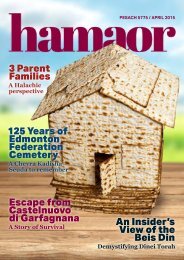HAMAOR MAGAZINE PESACH 5775
The Pesach edition of HaMaor magazine from the Federation for 5775 / April 2015
The Pesach edition of HaMaor magazine from the Federation for 5775 / April 2015
You also want an ePaper? Increase the reach of your titles
YUMPU automatically turns print PDFs into web optimized ePapers that Google loves.
THE TRUE MEANING OF SIMPLE >><br />
Rabbi Alex Chapper ILFORD FEDERATION SYNAGOGUE<br />
Eagerly awaited and enthusiastically delivered in<br />
many homes on Pesach night is the narrative of<br />
the Four Sons. But is calling a son a ‘simple’ son at<br />
the Seder the correct phrase in this day and age?<br />
Every year, new editions of the Haggadah are published<br />
that promise to be better than the last. They may boast having<br />
an updated translation, beautiful illustrations and in-depth<br />
commentaries all designed to enhance your Seder and make it<br />
a more meaningful and uplifting experience than ever before.<br />
This is highly commendable, as many people find it a struggle<br />
to keep the yearly celebration fresh and interesting and so<br />
whatever helps is certainly a bonus.<br />
However, what seems to be universal amongst the majority<br />
of these tomes is the way in which they present one of the most<br />
well-known passages in the entire Haggadah. Eagerly awaited<br />
and enthusiastically delivered in many homes on Pesach night<br />
is the narrative of the Four Sons - the wise, wicked, simple,<br />
and the one who does not how to ask. This group of four fits<br />
neatly within a recurring theme of fours which also include<br />
the Four Cups of Wine and the Four Questions and represents<br />
a quartet of approaches to understanding the whole story of<br />
the Exodus from Egypt.<br />
But in the 21st century, in an age of political correctness<br />
and disability awareness, it is somewhat jarring to depict<br />
one of these children as ‘simple’ which implies that they are<br />
intellectually deficient and lack the mental capacity of their<br />
peers. Is this something we should continue to portray in<br />
this way?<br />
Without being an apologist for this centuries old use of the<br />
word, let us strive to understand this subject in two ways.<br />
Firstly, from the context in which it appears, I suggest it<br />
does not mean ‘simple’ in the way that we traditionally read<br />
it. We have four sons, the chacham - wise, rasha - wicked<br />
followed by the tam - ‘simple’ and finally she’ano yoda’a lishol<br />
- the one who does not know how to ask. If the author of<br />
the Haggadah was attempting to represent different types of<br />
characters then the first and last - the wise and the one who<br />
does not know how to ask - are perfect opposites. Then we<br />
have the wicked child and we are left with the ‘simple’ one<br />
as his counterpart. But is the antithesis of wicked correctly<br />
defined as simple? Surely it should be a righteous child and<br />
then you would have two pairs: wise/not wise and wicked/<br />
not wicked. So can we translate tam in such a way?<br />
In an early dialogue, G-d calls to Avraham, ‘I am the<br />
Almighty G-d; walk before Me and be tamim - perfect.’<br />
(Bereishit 17:1) At the age of 99, when Avraham received this<br />
directive from G-d to be tamim, no-one would suggest it<br />
means ‘be simple’ but the Midrash explains that he is being<br />
commanded to be perfect in all of G-d’s tests of him.<br />
So here we have an example of tam not meaning ‘simple’<br />
but instead ‘perfectly righteous’ thus its use in the Haggadah<br />
is acting as the exact opposite to the ‘wicked’ son.<br />
Secondly, we find another reference to someone being tam,<br />
this time in reference to Yaakov: ‘And the youths grew up, and<br />
Esav was a man who knew hunting, a man of the field, whereas<br />
Yaakov was an ish tam, dwelling in tents.’ (Bereishit 25:27)<br />
Ish tam can mean ‘plain, honest, guileless’ but certainly<br />
not ‘simple’. Yaakov was the complete opposite of his wicked<br />
brother Esav who was skilled at cunning deception. Rashi<br />
explains that Yaakov is called tam because it is the term used<br />
to describe anyone not expert in deception and someone<br />
whose heart and mouth are the same. The Targum Onkelos,<br />
the Aramaic commentary, goes further and says that Yaakov<br />
was not only a perfect man but he also studied in an advanced<br />
academy - clearly not simple in any way!<br />
So the tam is anything but simple, he is intelligent but more<br />
importantly he is perfectly righteous and his genuine and<br />
straightforward question reflects his character. We answer<br />
him in kind by stating that G-d took us out of Egypt with a<br />
strong hand as a symbol that G-d supports the righteous -<br />
people like him.<br />
With this understanding we can view the tam as perhaps<br />
even more praiseworthy than the chacham; he is a shining<br />
example of someone who is complete in their faith, honesty<br />
and integrity.<br />
This year, by all means, acquire a new, all singing and<br />
dancing Haggadah but above all else, make sure it has the<br />
best translation.<br />
I wish you and your family a happy, healthy<br />
and kosher Pesach.<br />
Pesach <strong>5775</strong> / April 2015 <strong>HAMAOR</strong> 37



